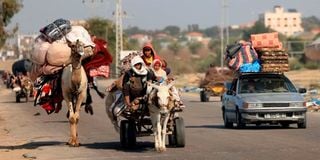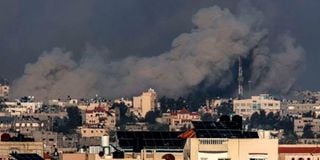
Palestinian flee from Khan Yunis to Rafah in the southern Gaza Strip on December 4, 2023, after the Israeli army called on people to leave certain areas in the city, as battles between Israel and Hamas militants continue.
South Africa’s lawsuit against Israel at the International Court of Justice makes one proud to be African. The case accusing Israel of committing genocide against the Palestinian people in Gaza represents one of those very rare occasions when an African country has taken leadership on the global stage.
The case charges that the Israeli incursions in Gaza, in retaliation for the deadly October 7 attack by Hamas militants, are “are genocidal in character because they are intended to bring about the destruction of a substantial part of the Palestinian national, racial and ethnical group”.
The case draws on the horrific death toll, more than 23,000 fatalities so far, and massive destruction from indiscriminate bombardments that do not distinguish between militants and civilian men, women and children. It also draws on public statements from Israeli Prime Minister Benjamin Netanyahu and other top government officials which indicate that the mission is aimed at total decimation of the Palestinian people.
It is not just revenge and retribution for the October incursion killed over 1,300. It is not about seeking to rescue over 200 Israelis held hostage by Hamas. Nor is it about destroying the military capabilities of Hamas, essentially a terrorist organisation that runs Gaza. It is about elimination of the Palestinian people. South Africa has provided persuasive evidence that the Israel invasion and occupation in Gaza is indeed genocidal in nature.
But Israel also has its counter-arguments. It justifies its actions on the basis that it was responding to the Hamas attack on its territory, and programs dedicated to the destruction of Israel and elimination of the Jewish people.

A picture taken from Rafah on January 5, 2024 shows smoke billowing over Khan Yunis in the southern Gaza Strip during Israeli bombardment, amid continuing battles between Israel and the Palestinian militant group Hamas.
It also has provided evidence that its attacks are carefully targeted at the Hamas leadership and military installations, with clear measures to avoid civilian casualties.
It argues that if there is indeed party to the conflict officially dedicated to elimination of the other and specifically targeting innocent civilians including children, women and the elderly, it is Hamas that should be in the dock.
Both sides have their points, but the import is that for the first time, Israeli actions in Gaza have been put under scrutiny on a stage where dispassionate arguments and the weight of evidence will take precedence over emotional and mindless partisanship.
National security
It may take many years before the International Court of Justice rules on the case. And there is every likelihood that if the Court rules against Israel, it will simply ignore the verdict and continue its offensive in Gaza. That will of course put the future of the Court under scrutiny as it has no enforcement mechanisms.

Buildings destroyed by Israeli bombardment in the Gaza Strip are pictured from a position along the border in southern Israel on January 5, 2024, amid the ongoing conflict between Israel and the Palestinian militant group Hamas.
Many of its most powerful backers, including the United States, Britain and other western nations that claim to stand in support of rule of law and human rights will be called out for hypocrisy as they are bound to back Israeli defiance of the international justice system.
Perhaps a key import of the case is in forcing a global conversation beyond the Israel-Hamas conflict, to resolution of the real causes. This is not just about Israel and Hamas, but about continuing Israeli occupation and annexation of Palestinian lands and denial of Statehood.
It is also about Israel’s right to exist within secure borders not forever under threat from a sick ideology that seeks to destroy the nation and its people. Beyond that, it has morphed into what can only be described as a war of civilisations, with anger over Palestinian alienation and oppression escalating into a global Islamic militancy that targets all nations and faiths that do not hew to a specific religious doctrine.
Kenya has not been spared. It has suffered a number of terrible terrorist attacks, and is to all intents and purposes in a state of war with Al-Shabaab and other radical extremist groups that seek destruction of our civilisation as we know it.
With the threats Kenya faces from terrorists within and without inspired by demented ideologies out of the Israeli-Palestinian conflict, the country of course has every right to take the most extraordinary steps in the interest of national security. That is not negotiable, but it still cannot be extended to include indiscriminate slaughter of men, women and children just on their religious and ethnic identity and presumption that they are of terrorist stock.
Responses must be weighted, measured and appropriate. That’s what is missing in what would be an otherwise justified Israeli response to Hamas terrorist attacks. That is why Kenya must stop sitting on the fence and join the growing number of countries expressing moral support for the South African case against Israel.
[email protected]; @MachariaGaitho







